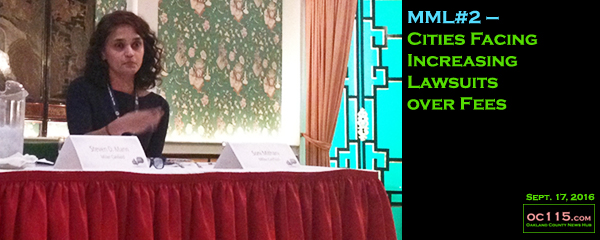Mackinaw Island, MI – Class action lawsuits against municipalities are becoming more common, particularly those over water and sewer billing. Litigation attorney Soni Mithani, a Principal at Miller Canfield in Ann Arbor, took time to educate officials about these types of suits at the Michigan Municipal League Convention on Sept. 15.
The Bolt case happened in 1998, and it said that since residents had a right to vote on taxes, cities had to be careful that fees were not really taxes in disguise. The main question for cities, Mithani said, is “What is a valid fee and what is an unlawful tax?”
Prior to Bolt, fees were “presumed reasonable unless proven otherwise.” This meant that fighting fees in court was a challenge. In 1978 the Headlee Amendment declared that taxes be put to a vote of the people, which is why there are so many ballot questions asking residents for tax approval. In 1994 the Headlee Blue Ribbon Commission determined that fees should be evaluated to see if they are taxes in disguise.
The lawsuit Bolt v. City of Lansing in 1998 came about because the owner of a parking lot did not believe he should be responsible for a sewer fee because the fee also was being used to pay off infrastructure improvements that separated the water and sewer system through the city. The owner did not want to pay for something that he was not using, and he called it a “rain tax” because he felt that he had not asked for the rain nor had asked the city to remove it from his property.
The Supreme Court decided to figure out what was a fee and what was a tax. This came down to three points that Mithani outlined. A “fee” must be (1) regulatory, (2) proportional and (3) voluntary.
The court determined that an ordinance (including those that pertain to fees) must have a regulatory purpose. “What is the purpose of the fee or ordinance? Do you seek to protect the citizenry? Does the language seek to raise health, safety and welfare of the community?” She noted that the ultimate goal is to protect the public, and she recommends framing ordinances using language that makes this purpose clear.
“A fee has to cover the actual cost of use,” Mithani said. She said fees cannot be used to be applied towards a fund balance, or even to save for future costs. They must cover the cost of service that a property owner is using.
Another feature of a fee is that property owners should have some level of control to avoid or reduce the fee. For example, sewer fees based on water consumption or usage are more legally sound than flat fees.
The rise of litigation involving fees happens in part because class action cases can be heard in the Circuit Court as opposed to through a fax tribunal. “It’s a really attractive way for attorneys to get their cuts,” she said.
Mithani shared what the basis of recent lawsuits have been about:
-Attorneys are challenging fees for infrastructure.
-Fees for general benefits like fire protection are being challenged.
-Fees that generate a high percentage of working capital are being challenged.
-Fees that go to the general fund are being challenged.
-New fees for things once covered by the general fund are being challenged.
-Keeping services consistent but raising fees can prompt a challenge.
-Fees for pension costs and administrative costs are being challenged.
She notes that any fee can be challenged, and that while the Headlee limits the time-frame for lawsuits, there are other avenues through which cities are being sued. Among the basis’ are unjust enrichment, ordinance violations, statutory violations, due process and equal protection.
One recommendation that can reduce the risk of lawsuit is to put fees to a vote of the people.
Municipalities should also be prepared to show the relationship between the fee and the value of the service, Mithani said.
Please visit the source link below to read the entire article.
Source: oaklandcounty115.com




